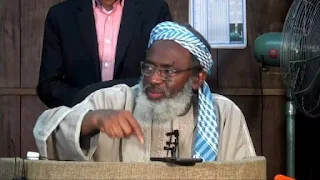Fresh revelations have surfaced indicating that renowned Islamic scholar, Sheikh Ahmad Gumi, was fully aware of a travel ban placed on him by the Saudi Arabian government, well before his attempt to travel for the 2025 Hajj pilgrimage.
On Monday, Gumi stirred public conversation when he posted on his official Facebook page that he was denied entry into Saudi Arabia, despite possessing a valid visa. The cleric, known for his controversial stances on both local and international issues, said he was turned back at the airport in Medina on Saturday, expressing disappointment over the development in a statement titled, “My Hajj 2025!”
However, a high-ranking official of the National Hajj Commission of Nigeria (NAHCON), speaking anonymously to The Guardian, contradicted the narrative. According to the official, Gumi had already been blacklisted by Saudi authorities and was well-informed about the restriction ahead of his journey.
“He has been banned from entering the Kingdom. While a visa may be issued, it does not override the authority of Saudi immigration or security services. Those flagged for entry restrictions are often denied access upon arrival,” the NAHCON official explained.
The official went further to clarify that such procedures are not uncommon. “He is not the only person who has been turned back this year,” the source said, adding that visa issuance does not equate to guaranteed entry when security red flags are involved.
When asked explicitly whether Sheikh Gumi was aware of the ban before his departure from Nigeria, the official responded affirmatively:
“Yes, he is aware.”
Gumi Claims Political Motive Behind Denial
In his statement, Gumi suggested that his exclusion from the 2025 Hajj was politically motivated, linking it to his critical views on global politics, which he claimed may have made the Saudi authorities “uncomfortable.”
“My political views on global issues apparently don’t sit well with the Saudi authorities. Despite granting me a Hajj visa, they prevented me from performing the pilgrimage,” Gumi said.
The cleric also thanked the Nigerian government for its prompt reaction to the incident, claiming that officials had already promised to engage Saudi authorities on his behalf.
“Thanks to the Nigerian authorities who have assured me they will take up the matter with the Saudi government immediately,” he noted.
Despite the setback, Gumi expressed a sense of personal peace. He used the opportunity to reflect on the situation spiritually and to focus on other responsibilities, such as his health and agricultural work.
Quoting Surah Al-Baqarah 2:196 from the Qur’an, he wrote:
“And accomplish the Hajj and the Umrah for Allah. But if you are prevented, [offer] whatever can be obtained with ease of sacrificial animals.”
He concluded by calling for prayers for Nigerian pilgrims, urging the faithful to ask for peace, unity, and prosperity for the country.
Background and Broader Implications
This development has once again thrown a spotlight on the complex dynamics between outspoken religious figures and international diplomacy. Sheikh Gumi has been a polarizing figure in Nigeria, often making controversial statements about national security and foreign relations.
While the Saudi government has not publicly commented on the matter, entry bans based on security or political concerns are not unusual in the Kingdom, especially during major events like the Hajj, which attracts millions of Muslims from around the world.
Observers say this incident could spark diplomatic conversations between Nigeria and Saudi Arabia, especially if more influential figures are affected in similar circumstances.


Post a Comment